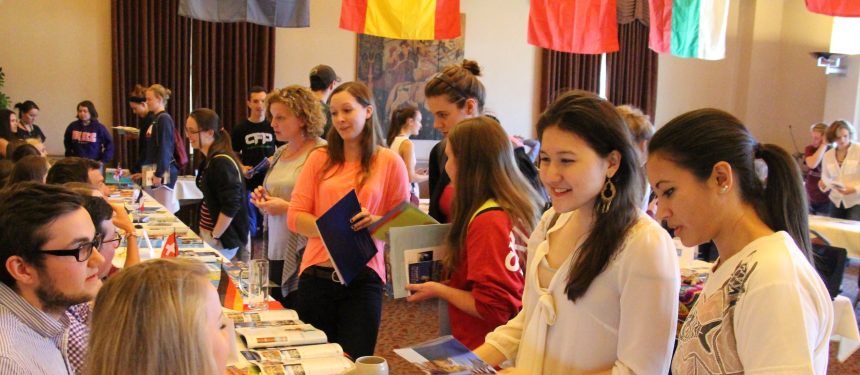There is now even more evidence that study abroad has a beneficial impact on employability after graduation, according to a report by IIE, with 11 out of 15 “21st century workplace skills” gained through an experience overseas.
News and business analysis for Professionals in International Education
Have some pie!
Study abroad impacts employability skills – IIE
 Students who are mobile for part of their degree gain employability skills, according to IIE research. Photo: Flickr/ roanokecollege
Students who are mobile for part of their degree gain employability skills, according to IIE research. Photo: Flickr/ roanokecollege Gaining an Employment Edge: The Impact of Study Abroad on 21st Century Skills & Career Prospects, released at the IIE Summit on Generation Study Abroad in Washington, DC found that studying abroad has an overall positive impact on the development of a wide range of job skills, expands career possibilities, and has a long-term impact on career progression and promotion.
The study was based upon a survey of more than 4,500 individuals who participated in short-term mobility since the 1999-2000 academic year. Among the participants, 30 individuals were selected for more in-depth interviews, which also contributed to the report.
More than half of survey respondents believe that study abroad helped them get a job, and longer-term study abroad experiences had a higher impact on subsequent job offers.
For those who were unsure whether study abroad helped them in employment, they still believed that study abroad was useful to their careers, particularly as they were promoted to management-level positions where communication, interpersonal skills, and the ability to understand and work with difference were key criteria for promotion.
“Knowing how to be sensitive to other cultures, and to learn from others, is essential”
IIE identified 15 soft and hard skills rated as most desired by 21st century employers. The top five skills, with more than 70% of respondents saying their study abroad experience contributed to a significant degree of improvement, were intercultural skills, curiosity, flexibility/adaptability, confidence, and self-awareness.
In addition, more than 50% noted significant gains in interpersonal and problem-solving skills. To a lesser degree, teamwork, leadership and work ethic were skills that were also reportedly improved through study abroad.
STEM graduates gained significant soft skills outside of their subject during study abroad, and it had a positive effect on their career. Among science majors that went on a program outside of the sciences, 47% reported their study abroad contributed to a job offer, whereas among those who went on a science focused experience, only 28% reported it did so.
Additionally, the survey investigated which features of study abroad contribute most to career success to help educators to design programs mostly likely to provide alumni with skills relevant to employers.
According to Christine Farrugia, deputy head of research at IIE, the aim of the paper was to discover practical takeaways for higher education institutions, and for study abroad programs, to help them understand what aspects of study abroad contribute to positive employment outcomes.
“One big outcome of the research is that short-term programs help to develop teamwork skills more effectively, or more highly than longer-term programs, so you know there’s just differences in how programs are designed and structured that lead to different kinds of employment outcomes,” says Farrugia.
“What we hope that the takeaway is for the field, is that integrating career-oriented learning outcomes from the beginning is really key to helping those students gain positive skills for their careers down the line.”
Employers agree that study abroad can have a positive effect on skills needed for today’s global workforce.
Transferable skills such as “adaptability, emotional intelligence, the ability to listen, and language skills gained through study abroad” are integral to the future of the global workforce, according to Gina Tesla, vice president, IBM Corporate Citizenship, who spoke on a panel at the IIE Summit.
“These days, all employees are brand ambassadors. Whatever they say and do is amplified as if they have a global microphone,” says Tesla. “Knowing how to be sensitive to other cultures, and to learn from others, is essential. They need to be savvy enough to articulate the values of our company to others.”
The full report can be downloaded at www.iie.org/employability.
Still looking? Find by category:


